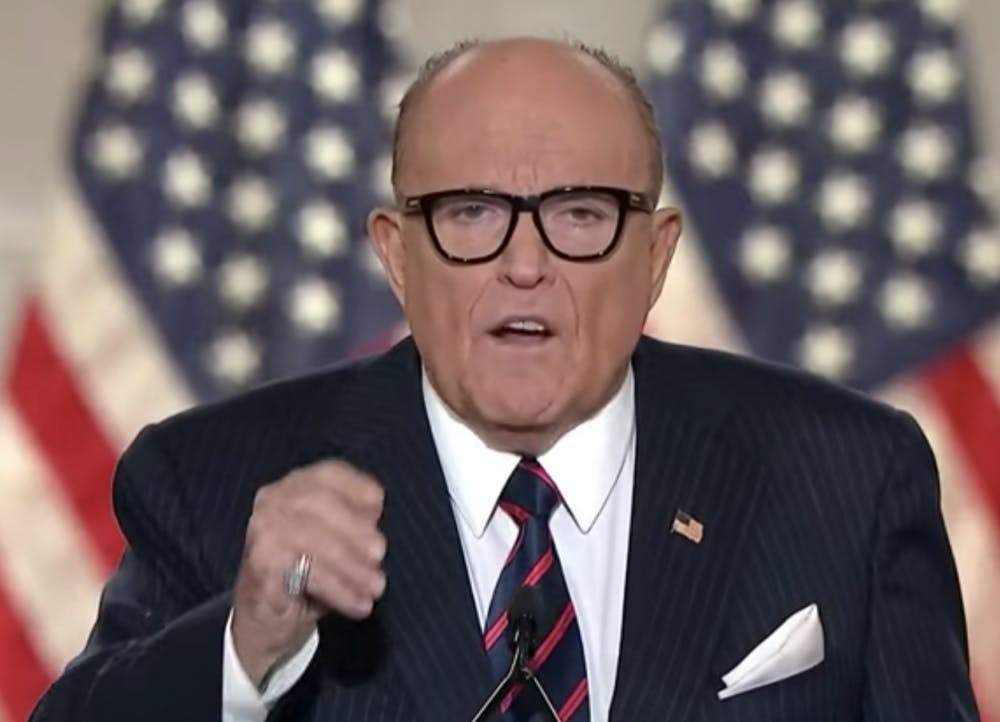Middlebury revoked Rudolph Giuliani’s 2005 honorary Doctor of Laws degree today in light of his role in fomenting the violent insurrection at the United States Capitol on Jan. 6.
Giuliani, President Donald Trump’s personal lawyer and former mayor of New York City, has spent months pushing the disproven conspiracy theory that Trump received more votes than President-elect Joe Biden in the November election. After repeatedly failing to provide evidence of voter fraud and overturn the election in court, he called for a “trial by combat” at the “March to Save America” rally in front of the White House on Jan. 6 in support of Trump. Later that day, the crowd violently stormed the capitol in a riot that left five dead.
Middlebury announced it was formally considering revoking the honorary degree on Sunday just hours after The Campus published an editorial calling for it to do so.
“Earlier this week, I spoke of our responsibility for safeguarding and improving our fragile democracy, especially those of us privileged to be in higher education,” President Laurie Patton said in reference to a campus-wide email sent after the violent insurgence at the Capitol. “As we pursue these goals, we must not be indifferent to the actions of those who are actively working against them, and opposed to our institutional values.”
Immediately after announcing that Giuliani’s degree had been revoked, an all-student email from Dean of Students Derek Doucet warned students of the “volatile climate” surrounding this issue, and offered resources for those who felt threatened or were in need of support.
Good for @Middlebury. If you tell a mob to engage in 'combat,' you don't deserve to be honored. https://t.co/HeukwdQrN3
— Bill McKibben (@billmckibben) January 10, 2021
Since Sunday, the move has garnered widespread support by students, faculty and alumni on social media. The Middlebury chapter of the American Association of University Professors (AAUP) sent a letter to the Board of Trustees urging them to rescind the degree earlier today.
AAUP President Professor Laurie Essig viewed the honorary degree as “legitimizing” Giuliani “after his major role in denying a free and fair election and helping to create a situation where there's now an armed insurrection” and betraying the values of Middlebury College.
The proceedings at Middlebury have attracted national news coverage and controversy as many students and alumni learned of Giuliani’s honorary degree for the first time — while it was in the process of being taken away.
Middlebury chose to award Giuliani an honorary Doctor of Laws degree and host him as the commencement speaker in 2005 to acknowledge the importance of 9/11 to the graduating class, who arrived at Middlebury for the first time less than a week before the attack, according to Campus reporting at the time.
Even then, Giuliani’s presence on campus was met with mixed reactions. Students published a series of opinion pieces opposing the decision and wore red cloth over their mouths during his commencement speech to protest his policies toward people of color, LGBT communities and the homeless while mayor of New York.
“Giuliani has a long and deeply disturbing history of turning a blind eye to police brutality, racial profiling, civil rights concerns, the health of the homeless and corporate greed,” wrote David Edelson, the Dean of Students for Cook Commons at the time, in a Campus opinion piece. “To me he is emblematic of the looming shadow of authoritarianism and of overbearing state power that is of such concern in our nation these days.”
The Campus also published an edited image of Giuliani with a Hitler mustache alongside an op-ed opposing Giuliani’s initial invitation, generating widespread controversy and resulting in the resignation of then-editor in chief Andrea Gissing.
Ben Gore ’05, who authored the op-ed more than 15 years ago, supports the college’s decision. “We are on the brink, and in moments like this we are as a country, making choices that are going to guide what happens the next five, ten, 15 years. Are we going to pull back from or go over [the brink],” he said. “Holding an honorary degree in the grand scheme of things, is small, [but rescinding it] is a symbolic thing for this community to do to say that this is well over the line of what we will accept.”
In sharp contrast to his efforts to overturn the election on false claims of fraud, Giuliani advised the 2005 graduating class in his speech, “Winning is wonderful. Winning in sports. Winning elections. It beats losing them. But the reality is that winning is only fulfilling if you do it through the rules, and you do it by being able to contribute to other people.”
Correction: An earlier version of this piece incorrectly identified David Edelson as a member of the class of 2005. He was the Dean of Students for Cook Commons at the time.

Sophia McDermott-Hughes ’23.5 (they/them) is an editor at large.
They previously served as a news editor and senior news writer.
McDermott-Hughes is a joint Arabic and anthropology and Arabic major.
Over the summer, they worked as a general assignment reporter at Morocco World News, the main English-language paper in Morocco.
In the summer of 2021 they reported for statewide digital newspaper VTDigger, focusing on issues relating to migrant workers and immigration.
In 2018 and 2019, McDermott-Hughes worked as a reporter on the Since Parkland Project, a partnership with the Trace and the Miami Herald, which chronicled the lives of the more than 1,200 children killed by gun violence in the United States in the year since the Marjory Stoneman Douglas High School shooting in Florida.




